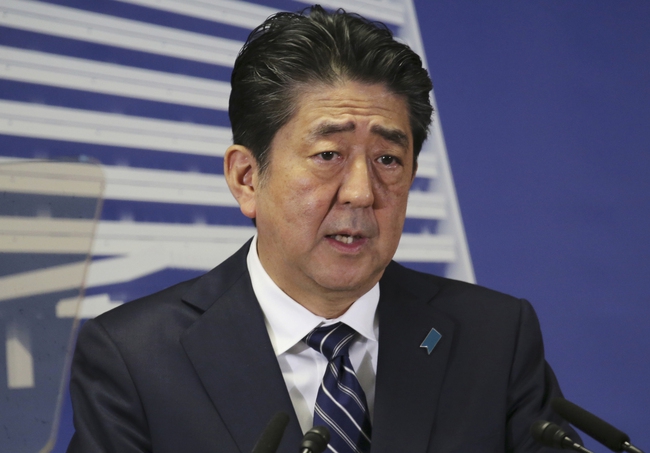 |
|
Japanese Prime Minister Shinzo Abe
|
Japanese Prime Minister attempting to show domestic audience that he is working to resolve the abductee issue
Japanese Prime Minister Shinzo Abe asked South Korean President Moon Jae-in to visit Japan ahead of his inter-Korean summit later this month, Japan’s Kyodo news agency reported. Abe’s request for a visit prior to the Apr. 27 summit was made during a Mar. 16 telephone conversation with Moon, Kyodo reported on Apr. 4, citing accounts from numerous Japanese government officials. According to the news agency, Abe’s request for a visit was intended to raise the issue of North Korea’s abductions of Japanese nationals. Tokyo has requested that both Seoul and Washington address the Japanese abductee issue in their upcoming summits with Pyongyang. Abe asked Moon to come in a return visit after his own February visit to South Korea to attend the opening ceremony of the Pyeongchang Winter Olympics, Kyodo reported. But the news agency also reported that Moon “avoided giving an immediate response” to Abe’s request. “In view of the difficulties coordinating Moon’s schedule amid preparations for the inter-Korean summit, the likelihood of [a visit] materialization is unclear,” it predicted. The Japanese government is also considering pushing for Moon to visit in between a South Korea-China-Japan summit and the North Korea-US summit, which is expected to take place no later than late May, Kyodo reported. Abe’s request for Moon to visit appears motivated by fears that Tokyo is being left out of dialogue developments on the Korean Peninsula. Moon has been expected to visit Japan if a trilateral summit with China is held in May. Abe is scheduled to meet with US President Donald Trump during a US visit ahead of the North Korea-US summit. Kyodo reported that Abe “concluded there was a need for the South Korean and Japanese leaders to take time ahead of the inter-Korean summit to discuss matters and bridge the gap in their positions.” But with Moon unlikely to accept the request to visit Japan first with the inter-Korean summit looming, Tokyo’s stance appears more likely intended as a political display for the domestic audience – meant to emphasize that Abe is taking action in various ways to resolve the abductee issue. Family members of the Japanese abductees have been arguing the current situation, with inter-Korean and North Korea-US summits scheduled to take place, represents a last opportunity for the issue’s resolution. Abe, for his part, has to show that he is working toward a resolution after naming it as one of his administration’s chief tasks. The Abe administration also needs to show domestic audiences that it is working to address its increasingly marginalized role on the North Korean nuclear issue as the Korean Peninsula dialogue developments progress. Trilateral summit between South Korea, China, and Japan under discussion Meeting with reporters on Apr. 4, a senior Blue House official said discussions on an early May trilateral summit with Beijing and Tokyo in Japan were “under way through the diplomatic line,” but denied the reports that Japan had invited Moon to visit. But during a briefing just after Moon and Abe’s conversation on Mar. 16, Blue House spokesperson Kim Eui-kyum said the two had “concluded that South Korea-Japan shuttle diplomacy would help in resolving the two sides’ issues and agreed on working-level coordination of a date for President Moon Jae-in to visit the Japan in the near future.” At that time, members of a special envoy’s delegation for Moon had just explained to Trump about the outcome of their North Korea visit and an agreement had been reached for the US-North Korea summit – suggesting a strong possibility that Abe did extend at least a pro forma invitation to Moon. The Blue House’s decision to deny the report about Moon’s invitation on Apr. 4 appeared to be based on its conclusion that it does not need to assign a wider role to Tokyo ahead of the inter-Korean summit. Its position may be that answering the request from Abe – currently anxious amid fears that Japan is being “bypassed” – could muddy the discussion agenda of the Korean Peninsula’s denuclearization and establishment of a permanent peace regime. During his visit for the Pyeongchang Winter Olympics on Feb. 9, Abe also called for the resumption of South Korea-US joint military exercises after the Olympics, prompting an expression of strong dismay from Moon, who described the decision as “a matter of our sovereignty and related to domestic affairs.” With the two leaders so far apart on Korean Peninsula issues and still nursing some resentments, Moon appears likely to decline the Japan invitation to focus on the inter-Korean summit. By Cho Ki-weon, Tokyo correspondent and Kim Bo-hyeop, staff reporter Please direct questions or comments to [english@hani.co.kr]






